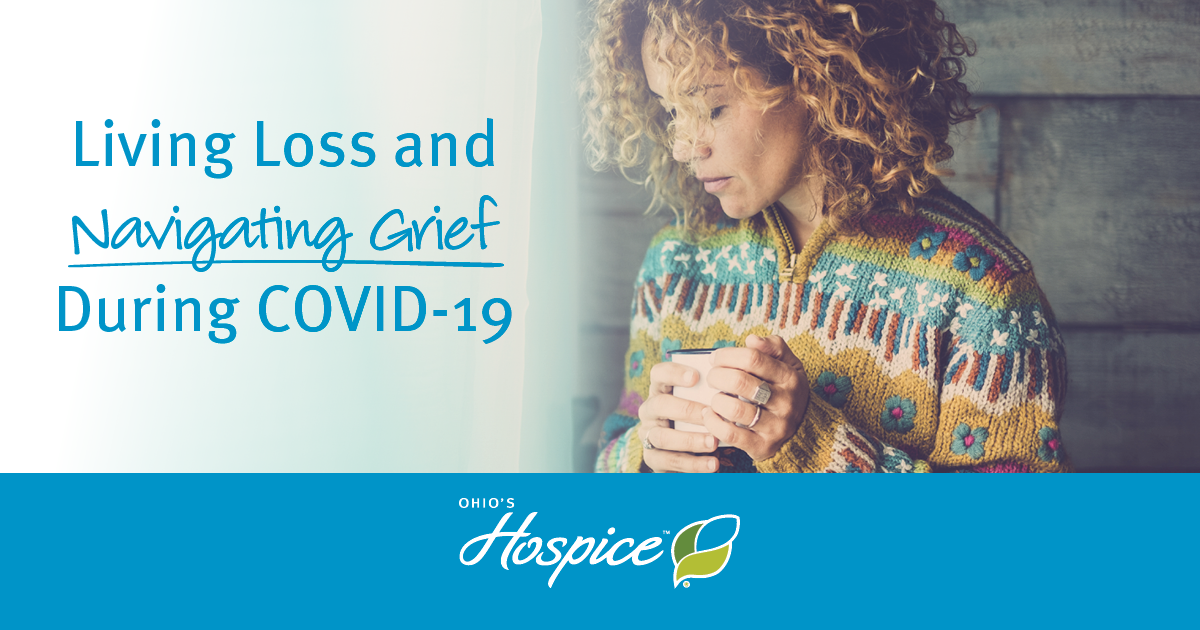
Living Loss and Navigating Grief During COVID-19
During the COVID-19 pandemic, many people are experiencing grief, even though they may not have experienced the death of a loved one or friend. This is known as a living loss. It is important to identify these symptoms and learn ways to navigate grief.
What Is a Living Loss?
A living loss is grief without a death. Because of COVID-19, people have lost a part of their everyday lives as they stay at home and limit in-person socializing. Experiencing grief is not limited to a physical death and is a normal response to the loss of the life one used to live before a life-changing event, such as a pandemic.
“We grieve when important things in our lives that we rely on are suddenly taken away. For now, we have lost life as we once knew it,” said Deb Holt, bereavement counseling professional at Ohio’s Hospice of Dayton.
During this time, people are experiencing a variety of losses, including loss of financial security, loss of control, loss of events (weddings, graduations, parties, etc.), and loss of connection to others. These losses can impact our emotional, mental and physical well-being.
What Are Some Symptoms of Grief?
The grief you feel with a living loss can be similar to the grief you feel with a death. People can feel a variety of grief symptoms including:
- Sadness, heaviness and anxiety
- Problems sleeping
- Irritability, restlessness and problems concentrating
- Change in appetite
If grief is not handled properly, it can settle into a depression.
How Do We Navigate Grief During COVID-19?
Strategies to cope with grief are not a one-size-fits-all. Some strategies that have been helpful for others are:
- Acknowledge your grief. People tend to be overwhelmed by something they do not recognize. Recognizing the symptoms and admitting the feeling of grief will help normalize the response. It is OK to grieve, no matter the circumstance.
- Take a break from the news. Whether you’re watching the nightly news or scrolling through social media feeds, viewing sad and depressing news coverage on the pandemic only feeds your grief. Instead, disconnect for a time.
- Take care of your body. Some ways you can take care of yourself include exercising, lessening caffeine intake, deep breathing exercises, and getting a good night’s sleep.
- Reach out and connect with others. It is important to have strong social support when you’re experiencing grief. Call or video chat a loved one and check in with people you haven’t heard from in a while.
- Focus on what you can control. Grief often makes us feel out of control. Help empower yourself by not dwelling on things that may or may not happen. Focus on controlling your routine, attitude and self-care.
Author Profile
Latest entries
 Media ReleaseJanuary 1, 2024Community Hospice to Join Ohio’s Hospice Strategic Partnership
Media ReleaseJanuary 1, 2024Community Hospice to Join Ohio’s Hospice Strategic Partnership #CelebratingLifesStoriesNovember 21, 2023Priesthood, Shelters and Hospice Care: A Life of Service for Barbara Parini
#CelebratingLifesStoriesNovember 21, 2023Priesthood, Shelters and Hospice Care: A Life of Service for Barbara Parini News and UpdatesJuly 28, 2023Ohio’s Hospice Volunteer Experiences Hospice Care as a Loved One
News and UpdatesJuly 28, 2023Ohio’s Hospice Volunteer Experiences Hospice Care as a Loved One News and UpdatesJuly 19, 2023The Not-for-Profit Difference
News and UpdatesJuly 19, 2023The Not-for-Profit Difference

